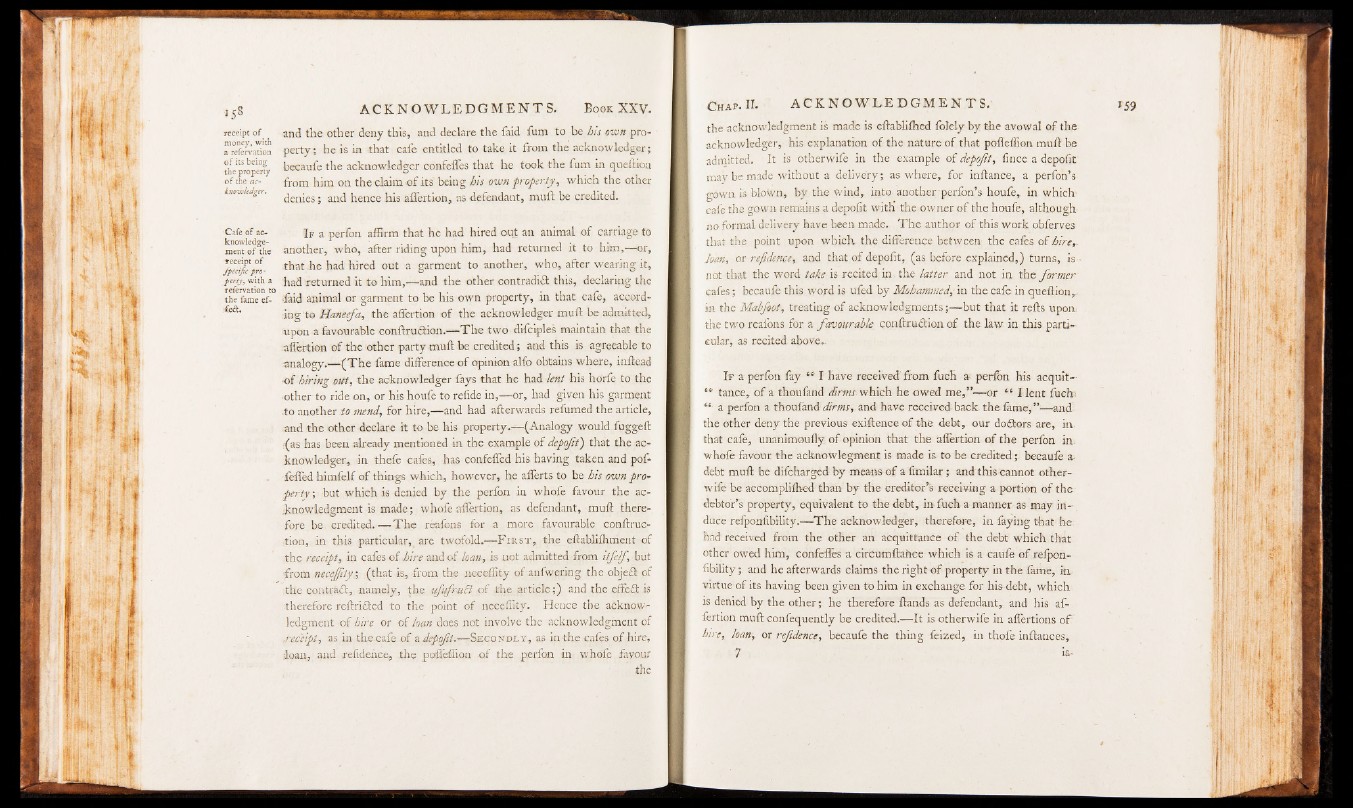
receipt o f
money, with
a refervation
o f its being
the property
o f the acknowledger.
Cafe of acknowledgement
o f the
receipt of
fpecific property
, with a
refervation to
the fame effect.
and the other deny this, and declare the faid fum to be his own .property;
he is in that cafe entitled to take it from the acknowledger;
becaufe the acknowledger confeffes that he took the fum in queftion
from him on the claim o f its being his own property, which the other
denies; and hence his affertion, as defendant, mull be credited.
I f a perfon affirm that he had hired out an animal of carriage to
another, who, after riding upon him, had returned it to him,— or,
that .he had hired out a garment to another, who, after wearing it,
had returned it to him,— and the other contradict this, declaring the
laid animal or garment to be his own property, in that cafe, according'
t« Haneefa, the affertion of the acknowledger muff be admitted,
■ upon a favourable conftru&ion.— T h e two difcipleS maintain that the
-affertion of the other party muff be credited; and this is agreeable to
analogy.— (T h e fame difference o f opinion alfo obtains where, inftead
•of hiring out, the acknowledger fays that he had lent his hdrfe to the
■ other to ride on, or his houfe to refide in,-—or, had given his garment
;to another to mend, for hire,— and had afterwards refumed the article,
and the other declare it to be his property.— (Analogy would fuggeft
(as has been already mentioned in the example of depo/it) that the acknowledger,
in thefe cafes, has confeffed his having taken and pof-
feffed himfelf of things which, however, he afferts to be his own pro*
perty; but which is denied by the perfon in whofe favour the acknowledgment
is made; whofe affertion, as defendant, muff therefore
be credited. — T h e reafons for a more favourable conftruc-
tion, in this particular, are twofold.— F i r s t , the eftablifhment of
the receipt, in cafes of hire and of loan, is not admitted from itfelf, but
from necejfity..; (that is, from the neceffity of aufwering the objeft of
the contract, namely, the ufiufrvfit of -the article;) and the eftedt is
therefore reftricted to the point of neceffity. Hence the acknowledgment
of hire or of loan does not involve the acknowledgment of
,receipt, as in the-cafe of a, depo/it.—- S e c o n d l y , as in the cafes of hire,
loan, and refidence, the poffeffion of the perfon in whofe favour
the
the acknowledgment is made is eftablilhed folely by the avowal of the
acknowledger, his explanation of the nature of that poffeffion muff be
admitted. It is otherwife in the example of depofit, fince a depofit
may be made without a delivery; as where, for inftanee, a perfon’s
gown is blown, by the wind, into another perfon’s houfe, in which'
cafe the gown remains a depofit with" the owner of the houfe, although'
no formal delivery have been made. The author of this work obferves
that the point upon which the difference between the cafes of hire,
.loan, or refidence, and that of depofit, (as before explained,) turns, is-
not that the word take is recited in . the latter and not in the former
cafes; becaufe this word is tiled by Mohammed,- in the cafe in queftion,,
in the Mabfiot, treating of acknowledgments;— but that it refts upon;
the two reafons for a favourable conftrudtion of the. law in this particular,
as recited above-
If a perfon fay “ I have received from fuch a; perfon his acquit—
I “ tance, of a thoufand dirms which he owed me,”— or “ I lent fuch:
I “ a perfon a thouland dirms, and have received back the lame,”— and-
I the other deny the previous exiftcuce of the debt, our doctors are, in-
I that cafe, unanimoully of opinion that the afiertion of the perfon in-
I whofe favour the aekaowkgment is made is to be credited;. becaufe a-
debt muft be difcharged by means-of a limilar; and this Cannot other-
wife be aeeomplilhed than by the creditor’s receiving a portion of the
debtor’s property, equivalent to the debt, in fuch a manner as may induce
refponlibility.— The acknowledger, therefore, in laying that he:
had received from the other an acquittance of the debt which that
other owed him, confefles a cirCumftafice which is a caufe of relpon-
libility; and he afterwards claims the right of property in the lame, in
virtue of its having been given to him in exchange for his debt, which
is denied by the other; he therefore Hands as defendant, and his affertion
muft confequently be credited.— It is otherwife in affertions o f
hire, loan, or refidence, becaufe the thing feized, in thofe inftances,
7 , ia: